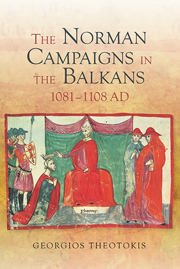Book contents
- Frontmatter
- Contents
- Acknowledgements
- List of abbreviations
- Map I Southern Italy and Sicily
- Map II The island of Sicily
- Map III The southern Balkan peninsula
- Genealogical table: The Norman dukes
- Dedications
- Introduction
- 1 Primary Sources and the Problems of Military History
- 2 Norman Military Institutions in Southern Italy in the Eleventh Century
- 3 The Byzantine Army of the Tenth and Eleventh Centuries
- 4 The Byzantine Naval Forces of the Tenth and Eleventh Centuries
- 5 The Establishment of the Normans in Southern Italy and Sicily
- 6 Robert Guiscard's Invasion of Illyria
- 7 The Norman Advances in the Balkans and the End of the Dream
- 8 Bohemond of Taranto and the First Crusade
- 9 The Count's Campaign of 1107 and the Treaty of Devol
- Conclusions
- List of Byzantine Emperors
- The Hauteville family
- Glossary
- Bibliography
- Index
1 - Primary Sources and the Problems of Military History
Published online by Cambridge University Press: 05 October 2014
- Frontmatter
- Contents
- Acknowledgements
- List of abbreviations
- Map I Southern Italy and Sicily
- Map II The island of Sicily
- Map III The southern Balkan peninsula
- Genealogical table: The Norman dukes
- Dedications
- Introduction
- 1 Primary Sources and the Problems of Military History
- 2 Norman Military Institutions in Southern Italy in the Eleventh Century
- 3 The Byzantine Army of the Tenth and Eleventh Centuries
- 4 The Byzantine Naval Forces of the Tenth and Eleventh Centuries
- 5 The Establishment of the Normans in Southern Italy and Sicily
- 6 Robert Guiscard's Invasion of Illyria
- 7 The Norman Advances in the Balkans and the End of the Dream
- 8 Bohemond of Taranto and the First Crusade
- 9 The Count's Campaign of 1107 and the Treaty of Devol
- Conclusions
- List of Byzantine Emperors
- The Hauteville family
- Glossary
- Bibliography
- Index
Summary
The Norman campaigns in the Balkans were, from their inception, seen from many different points of view, and every account and reference in the sources must be interpreted in the light of where, when, by whom and in whose interests it was written. It is only natural to assume that Anna Comnena, being the daughter of the emperor and presenting his point of view, would have had a different perspective on the events that unfolded in Dyrrhachium from Geoffrey Malaterra, a monk who wrote his history at the request of Roger Hauteville, and in order to please him and his audience. This explains my focus on the chroniclers' social, religious and educational background, the date and place of the compilation of their work, their own sources and the way they collected their information from them, their biases and sympathies and thus their impartiality as historians.
Amatus of Monte Cassino
The History of the Normans was compiled by Amatus of Monte Cassino around the year 1080. It is the earliest chronicle we have for the Norman establishment in southern Italy and Sicily from its earliest stages in the 1010s to the death of Richard I of Capua on 5 April 1078. The author provides little information about himself in his work; almost everything we know about Amatus comes from the continuator of the Chronica Monasterii Casinensis up to 1139, Peter the Deacon, and a work he authored himself, The Deeds of the Apostles Peter and Paul, dedicated to Gregory VII and probably written just before the composition of the History, around 1078/9.
- Type
- Chapter
- Information
- The Norman Campaigns in the Balkans, 1081-1108 AD , pp. 6 - 30Publisher: Boydell & BrewerPrint publication year: 2014



